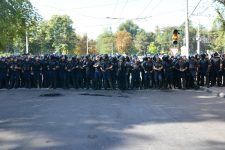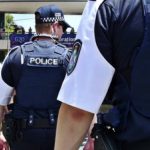Do Police Need More Weapons to Deal with ‘Lone Wolf’ Attacks?

For many of us, the memories of watching the Sydney siege unfold are still fresh in our minds.
Three people lost their lives when the saga culminated in a deadly shooting in the early hours of December 16 last year – two innocent hostages as well as the gunman, Man Haron Monis.
The siege, which lasted for about 16 hours and involved 17 hostages, was brought to a conclusion by tactical police officers storming the Lindt Café.
As a nation, we were shocked that this could happen in Australia, and stricken for the hostages.
Once media organisations started to get information about Monis in the aftermath of the siege, we heard that he had a history of criminal activity, but was not linked to a specific terrorist group. The fact that he carried out the atrocity on his own, a so-called “lone wolf attack”, was deeply unnerving for many.
Fast-forward two months to February 2015, and the world was again shocked to hear of another lone wolf attack, this time in the Danish capital of Copenhagen, in which two people were killed by the gunman and two police officers injured. Danish police fatally shot the perpetrator.
These incidents led to calls from the NSW Police Association for specialist training and equipment for general duties police officers to deal with these sorts of threats.
But is this is a good idea?
Do general duties police need these resources?
The rationale is that valuable time is wasted while police officers are forced to wait for specialist units to arrive. With the global increase of lone wolf attacks, the Association believes traditional methods of negotiation are less effective and simply delay action being taken to bring incidents to an end.
It called for general duties police officers to be trained to deal with such situations and for specialised long-range weapons to be carried in every police car.
According to a report in The Sydney Morning Herald, the Association asked both major political parties prior to the NSW election to consider a move to a more aggressive style of policing based on the United States model, in which police officers who are first on scene have the power to act immediately rather than waiting for specialist assistance.
The article also noted that most “active-shooter” incidents in the United States end within five minutes.
Objections to more weapons on the streets
Gun Control Australia responded to these proposals by saying that increasing the weaponry provided to police would inevitably lead to more police guns being lost or stolen, and eventually making their way onto the black market.
It said that it would be best to wait for an assessment and report of the Sydney Siege so that police could determine any operational changes to be implemented.
There is also the issue of adding to the duties of a police force that is already stressed due to low staffing levels.
Concerns given the number of police shootings
The views of the Association seem straightforward – where there is a lone wolf attack or terrorist threat, police who are first on scene should have the power to act immediately, instead of risking the lives of innocent bystanders or hostages by waiting for specialist assistance to arrive.
But in matters concerning police shootings, one constant theme is that all is not often what it seems.
According to the Australian Institute of Criminology (AIC), shootings by police are often complicated by the impairment of the alleged offender – including their mental state, drug or alcohol incapacity, or their failure to understand the seriousness of the situation and the consequences that may follow.
The AIC released a study that found that between the years of 1989 and 2011, there were 105 people fatally shot by police throughout Australia. 42 per cent of them had a diagnosed mental illness. Psychotic disorders and schizophrenia were the most common.
It is believed that even more were suffering from undiagnosed mental illnesses. These issues have been highlighted in a number of recent fatal police shootings in NSW, including the shooting of a woman outside a fast-food restaurant in Sydney’s west who was suffering from mental health condition.
Should general duties police have specialised weapons?
When police are receiving training to deal with a huge situations, how is it possible to adequately train them to deal with a potential terror situation, and to make an assessment about whether the suspect is suffering from impairment?
If the suspect were, say, hallucinating, that would surely dictate that the situation be handled very differently to one in which the suspect was acting without impairment.
Add to this the pressure of dealing with a situation in the “heat of the moment”, in which a police officer is making decisions under extreme pressure, and the use of specialist tactical units starts to make more sense.
A specialist unit has ongoing training in handling specific pressured situations, but a general duties police officer has broad training in a vast number of areas. Maybe we can draw an analogy with doctors, or even lawyers.
We wouldn’t necessarily want a general practitioner performing open heart surgery on a loved one, but we’d be very happy for a coronary surgeon to do so, due to the years spent training and honing their skills in that area.
Similarly, we wouldn’t ordinarily want a general legal practitioner to undertake a family law case for us – we would look for a specialist family law firm with Accredited Family Law Specialists.
Increasing police powers and weaponry to deal with lone wolf attacks is a very serious issue, and there is a real question about whether allowing general duties police to act would make a positive difference to the handling and outcome of these sorts of incidents.
The decision to use a firearm in a police operation is one of the most critical a police officer can make. As the AIC notes: “No other single issue has the potential to destroy the relationship between the police and the community like the use by police of deadly force.”
Any decision should not be made lightly, or as a kneejerk response to community feeling about the events of last December and the concerns surrounding terrorism generally.
Receive all of our articles weekly
Author






